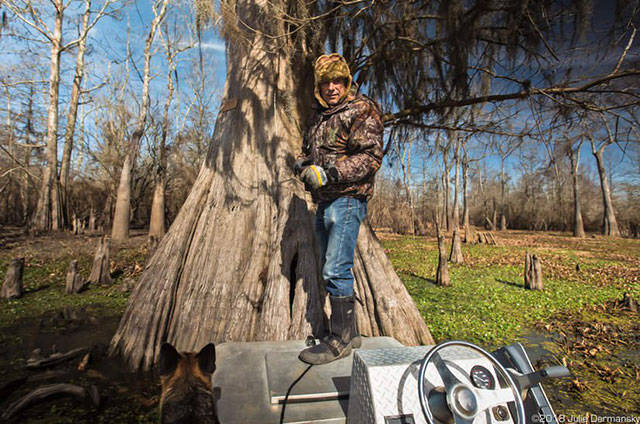
Though Energy Transfer Partners has all the permits and permissions it needs to start work on the Bayou Bridge pipeline, the project still faces multiple legal challenges.
The 162-mile pipeline, being built by the same company behind the Dakota Access pipeline, will span southern Louisiana from Lake Charles, near the Texas border, to St. James, about 60 miles west of New Orleans. This route will cut through the Atchafalaya Basin, a national heritage area that contains the US’s largest swamp.
“If the Bayou Bridge pipeline is built, a 75-foot-wide swath of trees will be pulverized,” Dean Wilson, executive director of the Atchafalaya Basinkeeper, told me, pointing to markers that surveyors recently put up along the pipeline route. The markers gave me a clearer picture of what will be lost if the pipeline is built.
Louisiana’s Legacy Trees
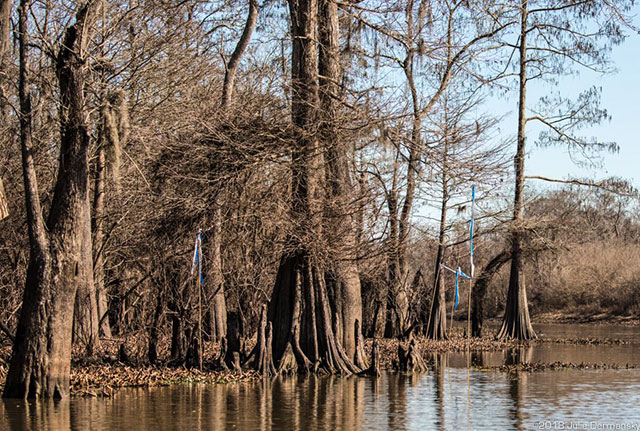 Markers tied along the route of the Bayou Bridge pipeline in the Atchafalaya Basin.
Markers tied along the route of the Bayou Bridge pipeline in the Atchafalaya Basin.
On January 15, I joined Wilson on a trip into the basin where he took Sierra Club Atchafalaya Committee Chair Harvey Stern, who is also coordinator of the Louisiana Purchase Cypress Legacy blog that identifies Louisiana’s old growth trees, and a group of activists opposed to the pipeline. The trip’s mission was to give Stern a chance to take core samples to determine the age of some of the cypress trees in the pipeline route’s path. This information could be used in the legal battle to stop the pipeline.
Stern will use the core samples and measurements of the trees’ girths to calculate the approximate age of the trees. He classifies “legacy trees” as those which were alive before 1803, when the US made the Louisiana Purchase.
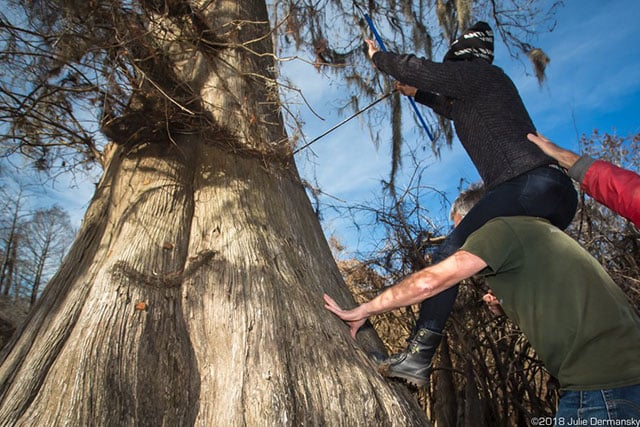 Team effort by Yudith Nieto, organizer with Another Gulf Is Possible, Dean Wilson and Harvey Stern to take a core sample from a cypress tree.
Team effort by Yudith Nieto, organizer with Another Gulf Is Possible, Dean Wilson and Harvey Stern to take a core sample from a cypress tree.
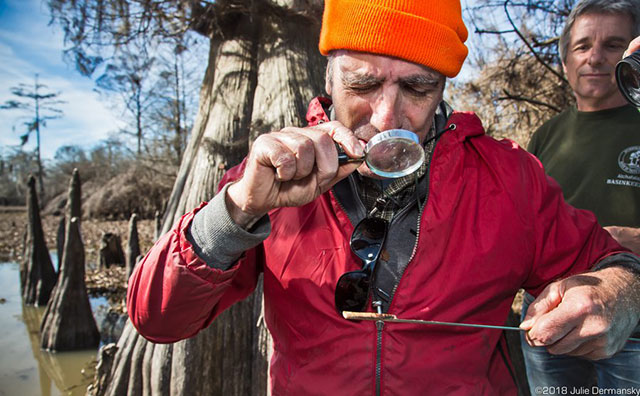 Harvey Stern examining a core sample taken from a hollow cypress tree in the Atchafalaya Basin.
Harvey Stern examining a core sample taken from a hollow cypress tree in the Atchafalaya Basin.
It troubles Stern that there is no count of the old growth cypress in the basin that would be sacrificed if the pipeline were built. Though Louisiana’s old-growth cypress forests are all but gone, there are still numerous trees well over 200 years old that Stern believes are worth protecting.
Wilson and Stern assert that if the pipeline had an environmental impact statement (EIS) done, it would likely have to consider the number of old growth trees destroyed and the role they play in the basin’s ecosystem.
An EIS is required by the National Environmental Policy Act for actions that significantly affect the quality of the environment, and is used as a tool for federal agencies to assess the environmental effects of their proposed actions prior to making decisions. In this case, however, the US Army Corps of Engineers didn’t deem an EIS necessary for this project, and granted a permit to Energy Transfer Partners without one.
“A project of this magnitude will certainly impact the basin,” Wilson said, “and the state needed to take such factors into account before permits were granted.” The absence of an EIS is a point of contention for the Atchafalaya Basinkeeper, the Waterkeeper Alliance, Gulf Restoration Network, and the Louisiana Crawfish Producers Association, which are working with Earthjustice to reverse the Army Corps of Engineers’ decision to grant a permit.
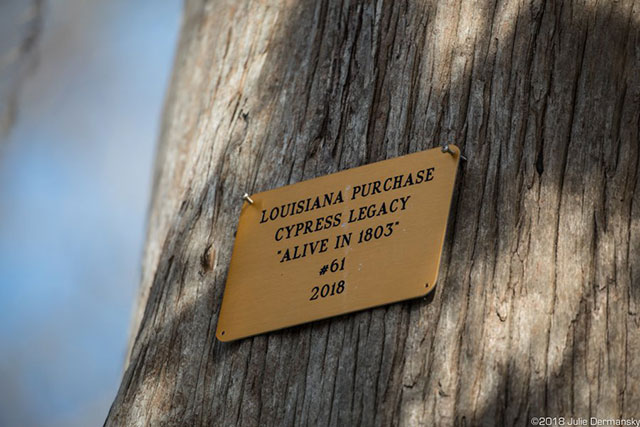 Cypress tree with a legacy marker in the Atchafalaya Basin.
Cypress tree with a legacy marker in the Atchafalaya Basin.
Bayou Bridge Lawsuits Pile Up
Earthjustice, a law firm committed to protecting the environment, filed a federal suit on January 7 calling for the court to repeal the permit awarded by the Army Corps. The lawsuit alleges that the government failed to consider irreparable harm to the Atchafalaya River Basin when it approved the oil pipeline.
Another lawsuit was filed last year by Tulane University’s Environmental Law Clinic on behalf of the Louisiana Bucket Brigade, 350.org, Gulf Restoration Network, and St. James residents. It seeks to revoke the permit granted by the Louisiana Department of Natural Resources (DNR), which has jurisdiction over a small part of the Bayou Bridge project in the coastal zone around St. James. The case, heard on January 3 by Louisiana’s 23rd Judicial District Court, is still under review.
Though the lawsuit didn’t refer to the lack of an EIS, Lisa Jordan, the clinic’s lead attorney, told me that if one had been done, it would have addressed some of the concerns of the St. James community. The clinic’s suit asserts that DNR’s permit should be invalidated until the agency conducts further studies of how the pipeline would impact the community.
A legal and educational nonprofit also recently spearheaded two cases related to the Bayou Bridge pipeline, calling for public records requests to be filled.
On January 3, the Center for Constitutional Rights challenged Louisiana’s St. Charles Parish Sheriff’s Office and Sheriff Greg Champagne to release public records, including communications with companies involved in the pipeline project and records related to law enforcement’s response to protests against the Dakota Access pipeline in North Dakota. The case was dismissed, but Pamela Spees, a lawyer with the Center for Constitutional Rights, told me the center plans to appeal.
And on January 16, the center filed suit on behalf of the Louisiana Bucket Brigade, 350.org New Orleans, and the Atchafalaya Basinkeeper, asking for Bayou Bridge LLC to turn over records relating to the company’s use of eminent domain, and for the governor’s office to release its communications with private entities involved with the project.
“Instead of calling for an Environmental Impact Statement throughout the months-long controversy about the pipeline, Louisiana Governor John Bel Edwards has repeated the company’s talking points,” Ann Rolfes, founder of the Louisiana Bucket Brigade, pointed out. She expressed her disappointment in a politician who claimed to champion the environment in an editorial published by NOLA.com.
“After 68 days of waiting [for the public records], the governor’s office sent me a laughable total of seven pages of irrelevant correspondence,” Rolfes said, prompting her organization to sue in order to compel a release of these records.
Louisiana’s governor hasn’t been shy about his support for the pipeline. Despite the controversies around the project, he told the Baton Rouge Advocate that “another pipeline traversing the Atchafalaya Basin wasn’t going to keep him up at night.
A Basin Already Affected
The Atchafalaya Basinkeeper’s Wilson hopes the challenges to the pipeline will serve as a wake-up call to everyone, including the governor, about the environmental damage existing pipelines have already caused in the basin, and the need for regulators to hold pipeline operators accountable for that damage.
Water flow is being hindered by spoil banks created when many of the pipelines already in the basin were first installed. Instead of filling in the trenches dug for their pipelines, non-compliant operators left piles of dirt lining their routes. Installing yet another pipeline underneath one of these spoil banks will make their removal close to impossible, and could further hinder natural water flow in the basin, which will impact crawfishing.
On our tour of the basin, as we pulled up to one giant hollow cypress bearing a plaque identifying it as a legacy tree, a beaver huddled inside the tree scurried away. Wilson explained the old-growth cypresses that remain are, for the most part, hollow. They are the only trees that had no value to loggers, who ended up sparing them. Aside from being majestic icons for the state, these hollow trees are of great value to otters, raccoons, black bears, minks, and squirrels. One reason, Wilson said, is that when the area floods, the hollow cypress act like a Noah’s Ark for the animals.
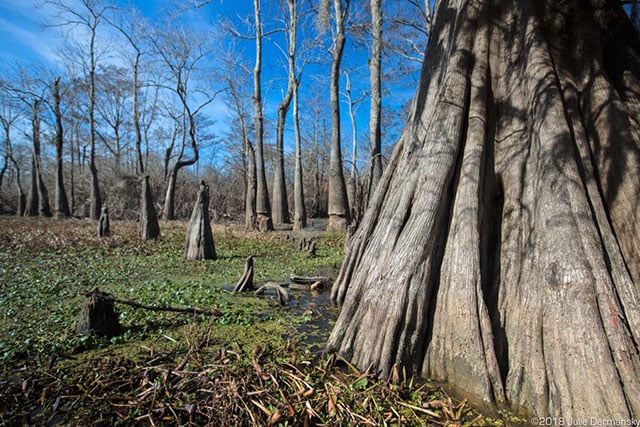 Cypress tree in the Atchafalaya Basin that is slated to be cut down along the Bayou Bridge pipeline’s proposed route.
Cypress tree in the Atchafalaya Basin that is slated to be cut down along the Bayou Bridge pipeline’s proposed route.
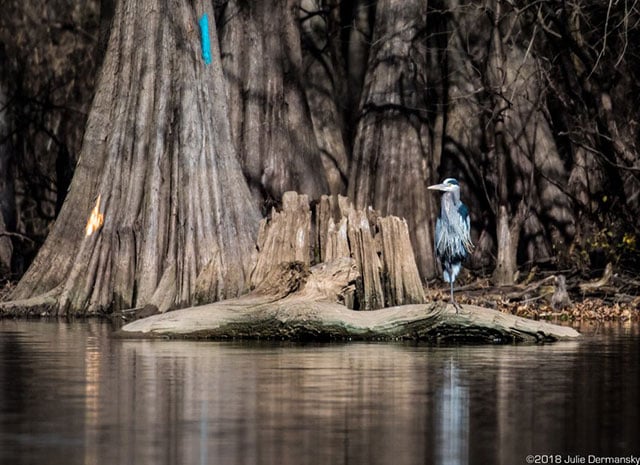 Great blue heron in the Atchafalaya Basin.
Great blue heron in the Atchafalaya Basin.
Can Energy Transfer Partners start building the pipeline before all of these cases are settled? The answer is yes, but the plaintiffs can seek an injunction. Wilson wouldn’t comment on what the coalition challenging the federal permit might do if pipeline construction starts before the suits are settled, but it was clear to me the fight against this pipeline is far from over.
4 Days Left: All gifts to Truthout now matched!
From now until the end of the year, all donations to Truthout will be matched dollar for dollar! Thanks to a generous supporter, your one-time gift today will be matched immediately. As well, your monthly donation will be matched for the whole first year, doubling your impact.
We have just 4 days left to reach our goals: raising $62,000 in one-time gifts and adding 930 new monthly donors.
This matching gift comes at a critical time. Trump has made it no secret that he is planning a demolition-style attack on both specific communities and democracy as a whole, beginning on his first day in office.
Help us prepare for Trump’s Day One, and have your donation matched today!